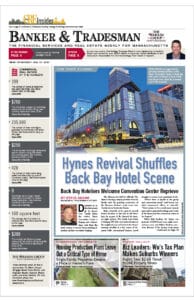A federal appeals court on Monday overturned a lower court ruling that had denied the Aquinnah Wampanoag Tribe of Gay Head the right to build a casino gaming facility on Martha’s Vineyard, opening the door to another possible casino in Massachusetts.
A U.S. District Court judge in 2015 ruled that the tribe failed to exercise sufficient “governmental power” over its tribal land and therefore could not operate any gaming facility there. The ruling also enjoined the tribe from opening any gaming facility without prior approval from the state and town.
In a ruling issued Monday, the U.S. Court of Appeals for the First Circuit reversed the district court’s ruling, finding the tribe had in fact exercised its governmental power by entering into agreements with other governments, passing ordinances and even employing a judge.
“The Tribe: has established a housing program that receives HUD assistance, and has built approximately 30 units of housing under that program; has entered into an intergovernmental agreement with the EPA; operates a health care clinic with the aid of the Indian Health Service; administers a program for education with scholarships financed with Bureau of Indian Affairs funding; administers social services with a human services director responsible for child welfare work; administers conservation policy … and administers a public safety program,” Judge Juan Torruella wrote in the court’s opinion.
The tribe had been seeking to convert its unfinished and vacant community center into an electronic bingo hall in Aquinnah and then use the casino revenue to promote the tribe’s economic development and fund various tribal programs. An overview of the plan published in 2015 said the tribe planned a facility with about 300 “gaming machines” that would support 100 full-time jobs.
The tribe estimated that the casino would generate $4.5 million before taxes in the first year of operation before growing above that number.
Two years after Massachusetts approved an expanded gambling law authorizing up to three resort casinos, the commonwealth sued the tribe in December 2013 after the National Indian Gaming Commission approved the Aquinnah’s gaming ordinance.
During the district court trial in 2015, lawyers argued about overlapping federal statutes passed within a year of each other. In 1987, Congress placed 485 acres of tribal land into trust with agreement that the state and town laws would continue to apply. In 1988, Congress passed the Indian Gaming Regulatory Act (IGRA), which sets up a framework for tribal gaming.
“The district court reasoned that IGRA did not apply, because the Tribe had failed to exercise sufficient governmental power; and that even if the Tribe had exercised sufficient governmental power, the [tribal land in trust agreement] … which provides that the Settlement Lands are subject to state laws and regulations (including gaming laws and regulations), governed,” Torruella wrote. “Because we find that the Tribe has exercised more than sufficient governmental power to satisfy the requirements of IGRA, and the Federal Act has been impliedly repealed by IGRA in relevant part, we reverse.”
Massachusetts legalized casinos and a single slot parlor in 2011, reserving up to three casino licenses in the west, the southeast and the Metro Boston area, and establishing a licensure process for tribal gaming. A slots parlor opened in Plainville and casinos are being built in Springfield and Everett.
Former Gov. Deval Patrick negotiated a gaming compact with the Mashpee Wampanoag Tribe to build a casino in Taunton, but after receiving the land in trust from the Interior Department in 2015 and breaking ground on a planned $1 billion First Light Resort and Casino in Taunton a federal court ruled that the tribe was not entitled to land in trust. Court proceedings to resolve that question are ongoing.






